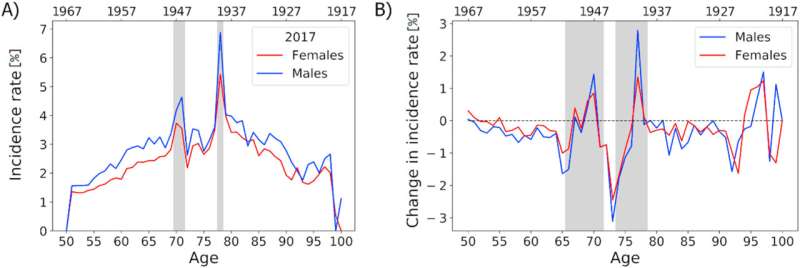This article has been reviewed according to Science X's editorial process and policies. Editors have highlighted the following attributes while ensuring the content's credibility:
fact-checked
peer-reviewed publication
trusted source
proofread
Malnutrition during pregnancy found to increase diabetes incidence

A number of studies have already shown that malnutrition during pregnancy may increase the risk of developing type 2 diabetes later on in life. According to a 2013 study by Peter Klimek and his team, people born during a famine have more than twice the risk of diabetes compared to those born one year earlier or later.
Now, for the first time, Klimek and his team have succeeded in measuring not only the total number of diabetes cases (prevalence), but also the incidence, or the number of new cases, in a recent study.
"Among men born during the two most severe famine periods, 1939 and 1946/1947, the rate of new cases of diabetes is up to 78% higher in 2013 to 2017 than in comparable years, and up to 59% higher among women," explains Klimek, from the Complexity Science Hub and the Medical University of Vienna. The effect is strongest in those born in 1939.
The incidence rate rose from 3.9% to 6.9% among men and from 3.4% to 5.4% among women. Additionally, both groups have an increased incidence of concomitant conditions such as heart failure, arterial hypertension, chronic obstructive pulmonary disease (COPD), and kidney disease.
Scientists believe this is a result of genetic programming that occurs during pregnancy, which increases the risk of these diseases. As a result of deficiency, the unborn child's metabolism adjusts to a nutritionally poor environment. If this does not prove true later in life, a maladaptation occurs that leads to increased metabolic and cardiovascular diseases in these birth groups.
Good data set
"One strength of our study is the new, large dataset on which it is based," says Klimek. This covers 99.9% of the Austrian population between 2012 and 2017, and all insured patients aged over 50 and under 100 were examined. Of these approximately 3.5 million people, 746,184 were treated for diabetes. The comprehensive dataset allowed researchers to measure age-specific and regional incidence rates directly for the entire population, without additional assumptions that would be required for modeling.
"Our results clearly demonstrate that public health efforts to address diabetes should not focus solely on lifestyle factors. The importance of reproductive health, as well as adequate nutrition during pregnancy and in the early postnatal period, must also be considered," Klimek said.
The study is published in the journal Heliyon.
More information: Michaela Kaleta et al, Diabetes incidence in Austria: The role of famines on diabetes and related NCDs, Heliyon (2023). DOI: 10.1016/j.heliyon.2023.e17570




















